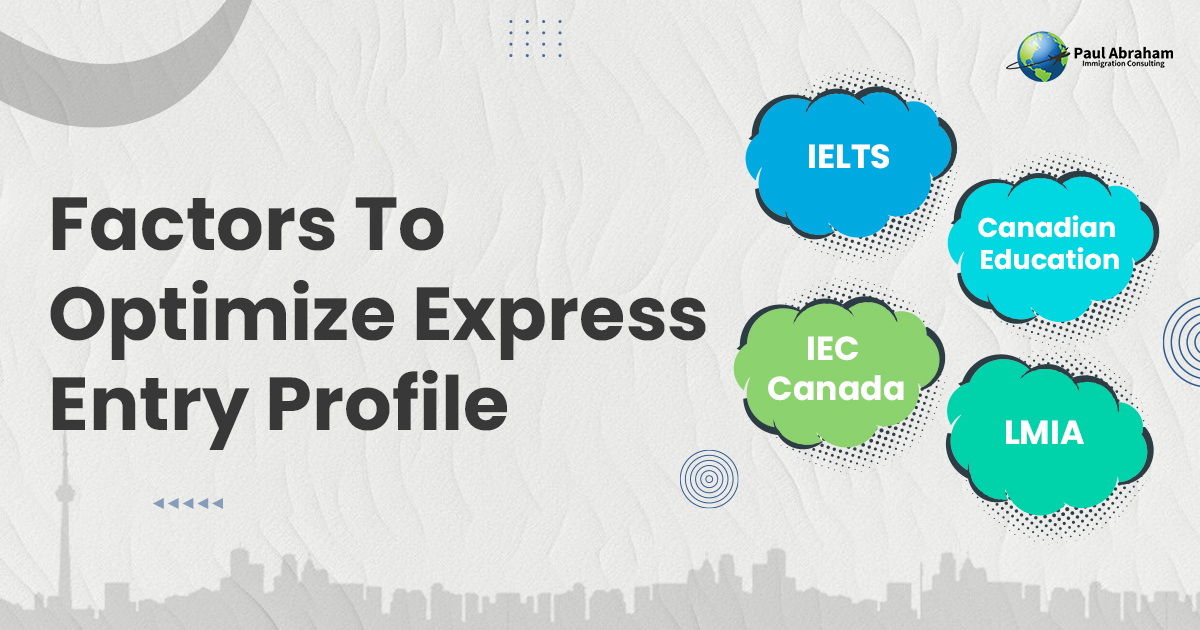Express Entry Profile Optimization for Work Permit Holders

Last Updated On : May 01 , 2024
Are you a candidate who has applied for Canada PR through the Canadian Experience Class program but has yet to receive an ITA from IRCC? Or are you working in Canada on a work permit and considering settling there permanently?
CRS Score is a major factor that can enhance your rank in the express entry pool. Our team of expert immigration consultants has prepared a guide that can help you increase these points.
The current housing crises in Canada have led IRCC to a higher demand for candidates from within Canada, including international students (with priority to Masters and PhD) and skilled workers holding temporary work permits, which increases chances for TR to PR.
Now, let's go through the steps to help you score higher in the Express Entry Pool.
- Join the International Experience Canada (IEC) Program
- Gain Relevant Canadian Work Experience
- Improve Your Language Proficiency Scores
- Leverage Canadian Education Credentials
- Demonstrate Skilled Work Experience
- Benefit from LMIA Work Experience
Step 1: Join the International Experience Canada (IEC) Program
Enrolling in the IEC program can increase your employability in Canada. You'll also better understand Canadian life, provinces, and living costs while improving your language skills. The work experience and language skills gained through IEC could increase your CRS score.
Step 2: Gain Relevant Canadian Work Experience
Two candidates applying for Canadian PR through Express Entry will have different CRS scores. The candidate with more experience will be ranked higher in the Express Entry pool.
Gaining Canadian Work Experience, with a minimum of one year of Canadian employment, is non-negotiable for CEC eligibility. The tenure must be full-time or, its equivalent, part-time.
Step 3: Improve Your Language Proficiency Scores
Language proficiency is important to meet additional eligibility conditions. Take IELTS or CELPIP for English or TEF and TCF for French. Bilingual candidates may receive additional points for their secondary language skills.
Once you receive these language scores, convert them to Canadian Language Benchmarks (CLB) scores. The CRS point system awards points based on your CLB score.
Step 4: Leverage Canadian Education Credentials
Have you completed your studies at a Canadian University or college? This can positively impact your Educational Credentials and increase your CRS score.
Studying in Canada could result in a higher CRS score in the Express Entry system than outside Canada.
Having a Canadian Education can provide you with an additional 15 to 30 points, depending on your Bachelor's or master's degree. Depending on your Education, you can get a maximum of 120 points for your CRS score.
Step 5: Demonstrate Skilled Work Experience
The latest IRCC policies show that the Canadian government seeks skilled professionals in the Masters and PhD streams. IRCC has started a STEM-based express entry draw for these streams.
There are TEER Categories 0 to 5 according to occupation, and depending on the in-demand occupation, you will get priority from a Canadian employer, which will indirectly enhance your profile.
Step 6: Benefit from LMIA Work Experience
If you have experience from an LMIA employer in Canada, it can earn you up to 50 additional points in the CRS system.
Take the Next Step:
Apply for Confirmation of Permanent Residence (COPR)
Hence, your profile is optimized, and the probability of receiving an ITA is increased, so you should be aware of the next step you have to take.
The next step is to complete all necessary processes for Confirmation of Permanent Residence, known as CORP, and apply for a Canada PR card.
Successful applicants receive a Confirmation of Permanent Residence (COPR), which an officer validates upon their arrival in Canada or at an IRCC office.
Secure Your Permanent Resident (PR) Card
Securing Your PR Card with the COPR in hand, you can apply for your Permanent Resident (PR) card, a key document for re-entry into Canada after international travel.
Additional Steps: Medical Examination and Police Clearance
Before obtaining permanent residence, applicants must undergo a medical examination by an IRCC-approved doctor and obtain a police clearance certificate from each country where they have resided for six months or more after age 18. It is prudent to have these documents available in advance to ensure timely submission of your e-application post-ITA.
